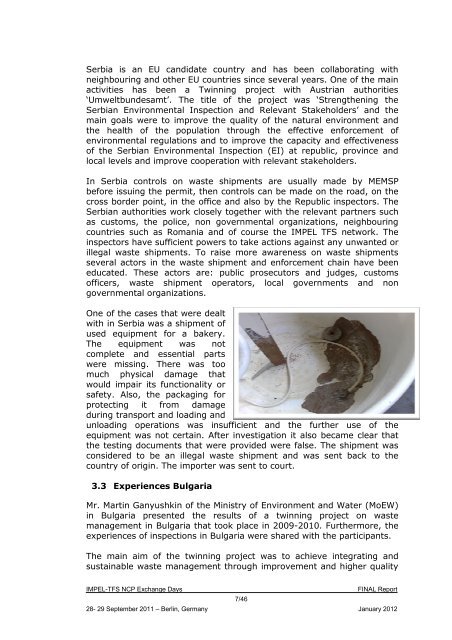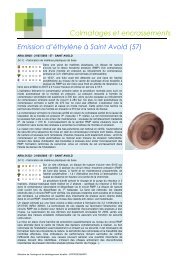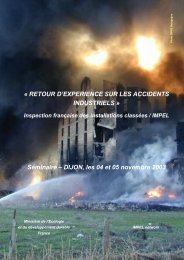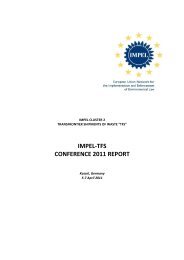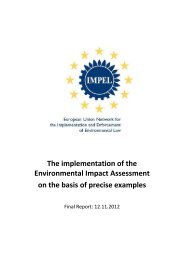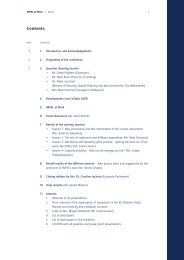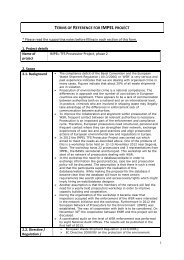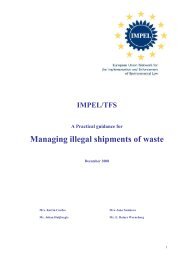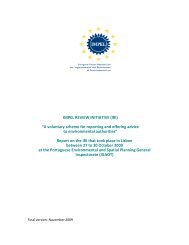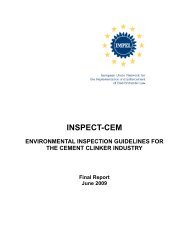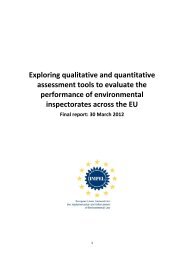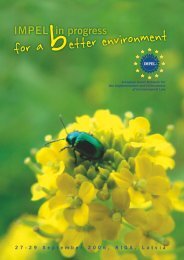Final report - IMPEL-TFS NCP Exchange Days 2011
Final report - IMPEL-TFS NCP Exchange Days 2011
Final report - IMPEL-TFS NCP Exchange Days 2011
Create successful ePaper yourself
Turn your PDF publications into a flip-book with our unique Google optimized e-Paper software.
Serbia is an EU candidate country and has been collaborating with<br />
neighbouring and other EU countries since several years. One of the main<br />
activities has been a Twinning project with Austrian authorities<br />
‘Umweltbundesamt’. The title of the project was ‘Strengthening the<br />
Serbian Environmental Inspection and Relevant Stakeholders’ and the<br />
main goals were to improve the quality of the natural environment and<br />
the health of the population through the effective enforcement of<br />
environmental regulations and to improve the capacity and effectiveness<br />
of the Serbian Environmental Inspection (EI) at republic, province and<br />
local levels and improve cooperation with relevant stakeholders.<br />
In Serbia controls on waste shipments are usually made by MEMSP<br />
before issuing the permit, then controls can be made on the road, on the<br />
cross border point, in the office and also by the Republic inspectors. The<br />
Serbian authorities work closely together with the relevant partners such<br />
as customs, the police, non governmental organizations, neighbouring<br />
countries such as Romania and of course the <strong>IMPEL</strong> <strong>TFS</strong> network. The<br />
inspectors have sufficient powers to take actions against any unwanted or<br />
illegal waste shipments. To raise more awareness on waste shipments<br />
several actors in the waste shipment and enforcement chain have been<br />
educated. These actors are: public prosecutors and judges, customs<br />
officers, waste shipment operators, local governments and non<br />
governmental organizations.<br />
One of the cases that were dealt<br />
with in Serbia was a shipment of<br />
used equipment for a bakery.<br />
The equipment was not<br />
complete and essential parts<br />
were missing. There was too<br />
much physical damage that<br />
would impair its functionality or<br />
safety. Also, the packaging for<br />
protecting it from damage<br />
during transport and loading and<br />
unloading operations was insufficient and the further use of the<br />
equipment was not certain. After investigation it also became clear that<br />
the testing documents that were provided were false. The shipment was<br />
considered to be an illegal waste shipment and was sent back to the<br />
country of origin. The importer was sent to court.<br />
3.3 Experiences Bulgaria<br />
Mr. Martin Ganyushkin of the Ministry of Environment and Water (MoEW)<br />
in Bulgaria presented the results of a twinning project on waste<br />
management in Bulgaria that took place in 2009-2010. Furthermore, the<br />
experiences of inspections in Bulgaria were shared with the participants.<br />
The main aim of the twinning project was to achieve integrating and<br />
sustainable waste management through improvement and higher quality<br />
<strong>IMPEL</strong>-<strong>TFS</strong> <strong>NCP</strong> <strong>Exchange</strong> <strong>Days</strong> FINAL Report<br />
7/46<br />
28- 29 September <strong>2011</strong> – Berlin, Germany January 2012


